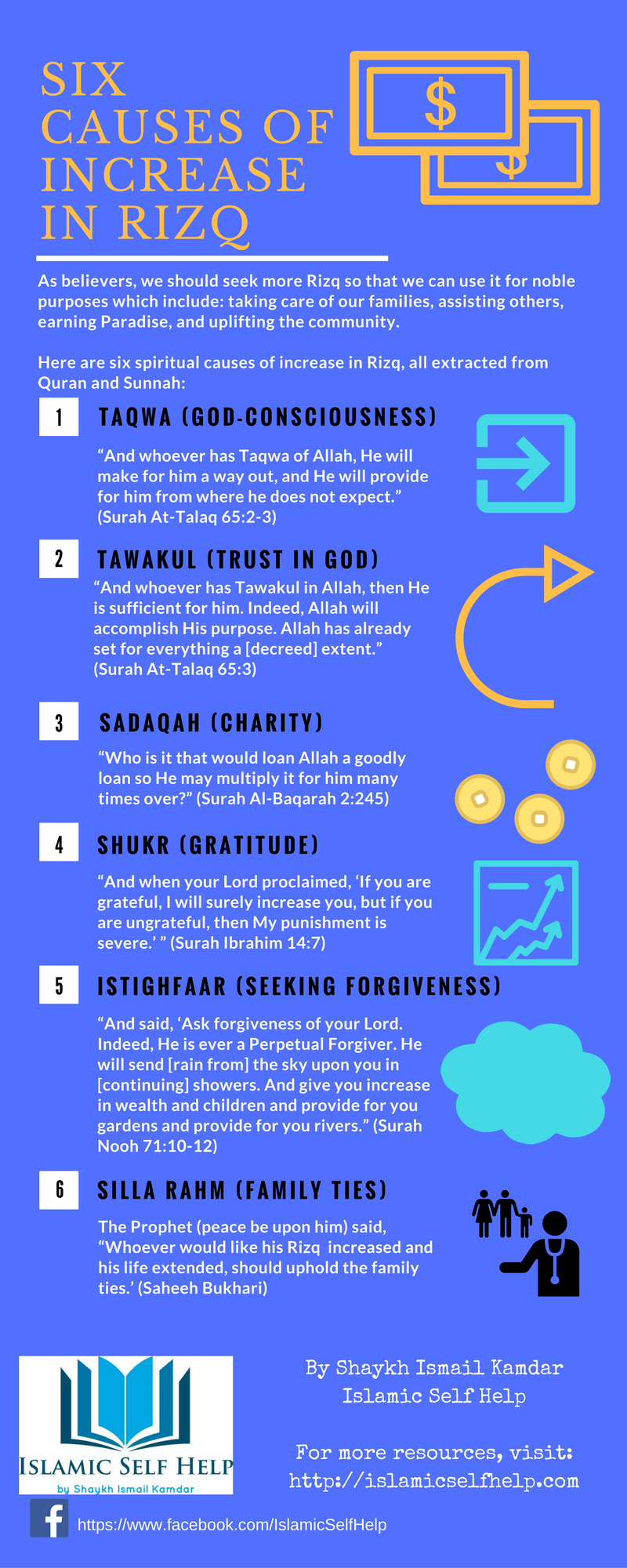Rizq
6 Spiritual causes of increasing Rizq
Increasing Rizq
Rizq (sustenance) includes many things: wealth, health, food, intelligence, resources, time, and life itself. All of these are things which Allah provides us with As Muslims, we believe that Allah is Ar-Razzaq (The Ultimate Provider) and that everything we have is from Him. Increasing Rizq is something that every i ndividual desires, although their intentions may differ.
ndividual desires, although their intentions may differ.
Some people want more of this world for wrong intentions, for materialistic reasons. This article is not for such people. The six acts of ibaadah outlined in this article assist the righteous in increasing their Rizq. They are spiritual causes of increase and will only benefit those with sincere intentions.
As believers, we should seek more Rizq so that we can use it for noble purposes which include: taking care of our families, assisting others, earning Paradise, and uplifting the community. We should seek increasing Rizq for such reasons and not selfish gain. With these intentions clarified, here are six spiritual causes of increase in Rizq, all extracted from Quran and Sunnah:
6 Causes of increasing Rizq
1. Taqwa
“And whoever has taqwa of Allah, He will make for him a way out, and He will provide for him from where he does not expect.” (Surah At-Talaq 65:2-3)
This is one of my favorite verses in the Quran. Multiple times in my life, I have witnessed and experienced people of Taqwa receiving Rizq from where they never imagined. This is the promise of Allah and Allah’s promise is always true. Increasing our Taqwa, and remaining firm on that Taqwa during times of trial, is the first and most fundamental step to experiencing miracles when it comes to Rizq. Taqwa is key to success.
2. Tawakul
“And whoever has Tawakul in Allah, then He is sufficient for him. Indeed, Allah will accomplish His purpose. Allah has already set for everything a [decreed] extent.” (Surah At-Talaq 65:3)
The second half of the above verse is often left out of our conversations. The first half emphasizes Taqwa, and the second half emphasizes Tawakul. Tawakul means to work your hardest, while remaining convinced that Allah will provide for you what is best for you. It is keeping strong faith in Allah’s assistance, even in the most difficult times. Tawakul is a crucial key for unlocking increased Rizq.
3. Charity
“Who is it that would loan Allah a goodly loan so He may multiply it for him many times over?” (Surah Al-Baqarah 2:245)
We shouldn’t give charity just to experience increase in Rizq. We should give charity to assist the poor and help others improve their lives. Nonetheless, the returns on giving charity are multiplied ten times over or more, depending on the sincerity of the intention and the quality of the charity. Generosity is a common factor you will found among all righteous Muslims who experience high levels of Rizq. It is the multiplier. If someone has Taqwa and Tawakul, and also gives a lot of charity, then they can expect their Rizq to multiply beyond their imagination.
4. Gratitude
“And when your Lord proclaimed, ‘If you are grateful, I will surely increase you, but if you are ungrateful, then My punishment is severe.’ ” (Surah Ibrahim 14:7)
The fourth rule of increasing Rizq is to be grateful for whatever Allah has currently given you, no matter how little you feel you have. The general rule is that complaining leads to decrease and gratitude leads to increase. Take a look at everything Allah has currently given you and thank Allah for each and every thing. Make gratitude a part of your daily routine.
5. Istighfaar
“And said, ‘Ask forgiveness of your Lord. Indeed, He is ever a Perpetual Forgiver. He will send [rain from] the sky upon you in [continuing] showers. And give you increase in wealth and children and provide for you gardens and provide for you rivers.” (Surah Nooh 71:10-12)
The fifth point is taken from the advice of Prophet Nuh (Peace be upon him) to his people. He informed his people that if they repented, then Allah would increase their Rizq. The verse mentions rain, wealth, children, gardens, and rivers. All of these are Rizq. So the fifth step is simple: we all sin every day, so we should all seek Allah’s forgiveness multiple times a day. This Istighfaar causes Barakah and increase in Rizq.
6. Maintaining Family Ties
The Prophet (peace be upon him) said, “Whoever would like his Rizq increased and his life extended, should uphold the family ties.’ (Saheeh Bukhari)
The final step is to maintain family ties. A true believer does not break ties with family, and goes out of his/her way to forgive and move on. When we do whatever we can to maintain family ties, the reward is increased Rizq and increased lifespan. This is the Barakah of maintaining family ties.
Final Reminder
Remember that Dunya is just a means to an end. It is the pleasure of Allah is most important. Increase in Rizq is not worth much if we do not use that Rizq to earn Allah’s pleasure. Remember that increased Rizq also means increased accountability on the Last Day. Remember that we will be answerable for our wealth, time and health, and Allah will ask us what we did with all these gifts He gave us.
Learn how to increase Barakah in time with our Best-Selling eBook:
3 Reasons Every Muslim Should Learn Time Management
Reasons to learn time management
Every Muslim must learn time management and here is why:
One of the more irritating parts of being a Muslim who is focused on time management is that I end up spending a lot of time waiting for others. This is because many Muslims are late for everything, from appointments to classes, meetings, and even Salah. In general, if someone plans to meet me at 6pm, I am usually there at 5:45pm and they usually pitch up around 6:30pm. (at the earliest)
Being late for appointments and Salah are such a norm in Muslim society today, that we even joke about it and call it MST (Muslim Standard Time). As funny as that sounds, it does indicate a problem with our ummah, a lack of time management.
As Muslims, time management should be a skill we as a community should master, at least for the following three reasons:
1. We will be asked by Allah about our time and how we spend it
“Take benefit of five before five: Your youth before your old age, your health before your sickness, your wealth before your poverty, your free time before you are preoccupied, and your life before your death” (Narrated by Ibn Abbas and reported by Al Hakim) 
This hadith lists five blessings which each of us will be questioned about on the Last Day. Allah will ask us how we spent our youth, our health, our wealth, our lives and our time. Knowing this, how can we justify wasting our lives away without any control over how we spend it?
As believers, we must take stock of our time and hold ourselves accountable for how we manage it before Allah calls us into account for it on the Last Day.
2. We know that life in this world is temporary
“Definitely, I made whatever is on this earth beautiful to test which of them are best in their deeds, and I will make all of it into dry soil,” (Surah Al-Kahf 18:7-8)
This world is a test and it will eventually come to an end. Knowing that the world will end and that our time in this world is likely to end long before that should create a sense of urgency in how we live our lives. We only have a limited amount of time to make things count and to accomplish as much as we can. Knowing this, there is no excuse for the mismanagement of our time.
3. Time is a provision from Allah
“There are two blessings which many people lose: (They are) health and free time for doing good.” (Bukhari 8/421)
Many people think of only wealth as Rizq (sustenance) but our health and time on this earth are also provisions from Allah, and just like we are accountable for our we spend our wealth, we are accountable for how we spend our time.
Time is an asset, if mismanaged it can lead to years of regret. If managed well, it can lead to accomplishing more in our short time on earth that you thought possible. The choice is yours, each individual needs to realize the value of their time and make every day count. This is why every Muslim must learn time management.


